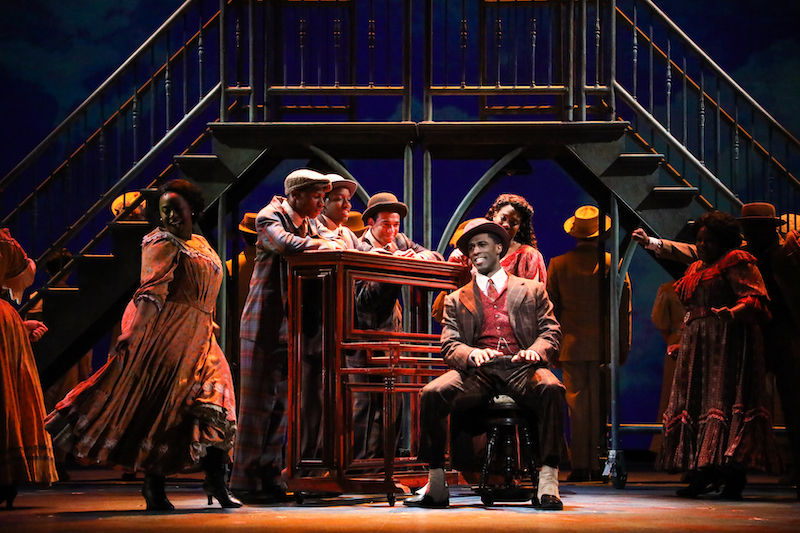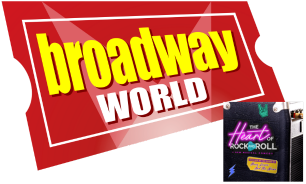Interview: Tony-nominated Director Marcia Milgrom Dodge Talks RAGTIME

Best Direction Tony Award® nomination
for the 2009 revival of RAGTIME,
directs the Theatre Under The Stars
production of RAGTIME, now playing at
the Hobby Center through April 28, 2019.
Based on E.L. Doctorow's groundbreaking novel, RAGTIME follows Coalhouse Walker Jr., a black Harlem musician; Mother, the matriarch of a white upper-class family in New Rochelle, New York; and Tateh, a Jewish immigrant from Latvia.
Featuring a Tony Award®-winning book from Terrence McNally and Tony Award®-winning score from Stephen Flaherty and Lynn Ahrens, the acclaimed, award-winning musical explores race, class, and gender.
From April 16-28, 2019, Theatre Under The Stars (TUTS) presents RAGTIME at the Hobby Center for the Performing Arts.
Kevin Depinet (set designer), Santo Loquasto (costume designer), Matthew Richards (lighting designer) and Andrew Harper (sound designer) comprise the design team; Brad Haak is musical director; and Marcia Milgrom Dodge, who received a Best Direction Tony Award® nomination for the 2009 revival of RAGTIME, directs.
We got the chance to chat with Dodge about RAGTIME -- its relevance to the current U.S. political climate, detained migrant children and the Trump wall, and what makes it one of the best musicals of the 20th (and 21st century). Take a look at an edited and condensed version of our conversation below.
BroadwayWorld: In researching RAGTIME, I found that there was quite a bit of focus on what the characters symbolized (as opposed to their humanity); e.g. Coalhouse represents African Americans and Tateh represents Jewish immigrants. I'm interesting in knowing whether or not that's something you had to struggle with.
Marcia Milgrom Dodge: My approach is to dig in and create relationships, so I'm not dealing with putting actors on stage in some kind of symbolic gesture. My role as a director is to get involved in the characters and their struggles and to put them out there as authentically as possible. So, it is not a museum piece. It is not that I want you to sit back and witness. I want you to participate. I want you to lean forward, lean in, and share in these journeys that these three disparate groups are taking in the story.

Theatre Under the Stars, 2019.
Photo credit: Melissa Taylor
BroadwayWorld: You consider RAGTIME one of the greatest musicals of the 20th century?
Marcia Milgrom Dodge: Yes, it was written in 1998, so it just made it to the end of the 20th century.
BroadwayWorld: So two questions: Why? And why not the 20th and 21st century? [Laughs]
Marcia Milgrom Dodge: Well, if we're keeping it going, it's for sure [one of the greatest musicals of the 20th and 21st century].
I think it starts with E.L. Doctorow's novel. It changed the face of fiction writing. It was the first of its kind--historical fiction. And I think the story, as devised by Terrence McNally, Lynn Ahrens and Stephen Flaherty, in turning it into a musical was craftsmanship at the highest order. Terrence was able to weave these three primary stories seamlessly in and out. And you're never for one moment lost or confused. You're taken on this journey.
And Steve Flaherty and Lynn Ahrens' songs have become classics in the musical theater canon. And I would say songs like "Wheels of a Dream" and "Make Them Hear You" are as electrifying as when audiences first heard "If I Loved You" from CAROUSEL or "Climb Ev'ry Mountain" from SOUND OF MUSIC. They have become iconic "I want" songs, "dream" songs of the 20th and 21st century.
and Michael Karash as The Little Boy.
Theatre Under the Stars, 2019.
Photo credit: Melissa Taylor
And because there's the political context around the show, it's more than the sum of its parts in a way. It is on some level an entertainment--musical theater certainly fulfills that design--but, I like to say, it's got a lot of meat on its bones. It's a meaty story, and series of stories, and I think that the craft by these artists is unparalleled. I think emotionally you are taken on incredible journeys. Not just the journey of Coalhouse Walker Jr., who is wronged and comes back retaliating with a mighty force. It's also the story of an accidental feminist in the character of Mother.
BroadwayWorld: How is Mother an accidental feminist?
Marcia Milgrom Dodge: She lives a very comfortable, seemingly perfect life until one day her whole world is turned upside down with the discovery of a baby buried in her garden--a black baby. And what does she do? She cares for this child. And this is 1906. The time period of our show is right at the birth of the 20th century. So she's doing what her heart's telling her to do and in doing so becomes a kind of feminist icon. She doesn't set out to do it. She certainly had no plan. It happened to her and she responded. I connect with her in a huge way.
And then the story of her meeting Tateh--Tateh being at the depth of despair in a mill making pennies for working endless hours. He magically discovers an idea that turns him into a millionaire. It's like the American Dream on steroids! [He, Mother and their children] become family. And she's taking care of this child now. And so you have a Latvian Jew, an upper-class New Rochelle white woman, a black little boy, and [Tateh's] daughter and [Mother's] son by previous marriages. You have the perfect blended family.
BroadwayWorld: How do you connect with Mother and her story?
Marcia Milgrom Dodge: That's a story I can relate to so deeply because I'm Jewish. My husband is not. And we adopted our daughter from Russia. So I connect on a very deep level to the story of how to make family. Families can be made in very different ways than you might expect them to be made. So that to me is a beautiful story.
BroadwayWorld: You directed the 2009 revival of RAGTIME. How does the show resonate in 2019?
Marcia Milgrom Dodge: When I did the show first in 2009 at the Kennedy Center, it was [Barrack] Obama's inaugural year as president. So, we were telling stories about struggles of an African community, a Jewish immigrant community, and a white New Rochelle [New York] upper class community and how they intersect and cross each other through their struggle. And at that time, [we said]: Anything is possible in America. We just elected a black man as president. Isn't that remarkable and wonderful? So the [RAGTIME] story was one of great hope and affirmation.
And now, ten years later, we're back telling this story and the plight of the immigrant is now front and center [in American discourse]. And [RAGTIME] is not an affirmation. It's a call to arms. It's a cautionary tale. We're telling the story as if we're back in the civil rights movement. It's a very different environment to be telling the story in.
in the 2009 revival of RAGTIME.
Theatre Under the Stars, 2019.
Photo courtesy of Theatre Under the Stars
People say that RAGTIME is more timely now, and I say that's a very sad thing because RAGTIME should be how I approached it the first time. It should be a wondrous journey of struggle, of pain and suffering where there's light at the end of the tunnel and where you come out better, and more kind, and more resilient, and more accepting. And now that focus is shifting and it's more of a demand. It's more of, put a mirror up against the society that we're living in now and saying, "Shame on you."
Why do we have to tell this in a different tone? Why can't we tell this with the hope and love that we set out to tell it with before?
It's a very complicated time to be doing the show. And it's a very necessary and essential time to be doing to the show.
BroadwayWorld: Do you have less hope now?
Marcia Milgrom Dodge: I would say, I would like to have hope. And I think that we, as Americans, are a resilient bunch, so I would like to believe that there's hope. But as far as diversity and acceptance goes, we have a leader right now who isn't endorsing that in our political [discourse]. And so I think that people are being given permission to behave badly. And I want to hopefully stir that thinking in people when they come to see our show.
I don't want this to be didactic. I don't want this to be a chore. I believe that [RAGTIME] is one the great musicals of the 20th century and I'm thrilled to share it with the Houston community. But it's also not lost on me that it is a dramatic story. It's not pure entertainment. And the great thing about TUTS is that it's the place where you can see MAMMA MIA and escape and have a really phenomenal, fun, uplifting disco evening and, in the same season, you can see RAGTIME, which may be a more challenging experience in the theater but no less rewarding because there's glorious singing. There is hope. And there is a conscious decision, particularly on my part, to celebrate diversity and celebrate integration and celebrate communities not just criss-crossing each other, but blending.
Marcia Milgrom Dodge's work as a director and choreographer has been seen throughout the United States and in Canada, England, Asia, Denmark and the Middle East; on Broadway, Off-Broadway; and at acclaimed regional theatres such as the New York City Opera, John F. Kennedy Center of The Performing Arts, Arena Stage, and Goodman Theatre. Dodge's work has won the Helen Hayes, Carbonell, Los Angeles Drama Critics, Backstage Garland, Dora Mavor, New York Outer Critics Circle and Daytime Emmy Awards and she has been nominated for the Tony®, Drama Desk, Astaire, Drama League, Barrymore and Edgar Awards. Learn more about Milgrom Dodge at marciamilgromdodge.com.
RAGTIME runs April 16-28 at the Hobby Center for the Performing Arts, 800 Bagby Street. Information is available at online at TUTS.com, by phone at (713) 558-8887, or in person by visiting the Box Office located at 800 Bagby Street. Tickets start at just $30.
Videos
